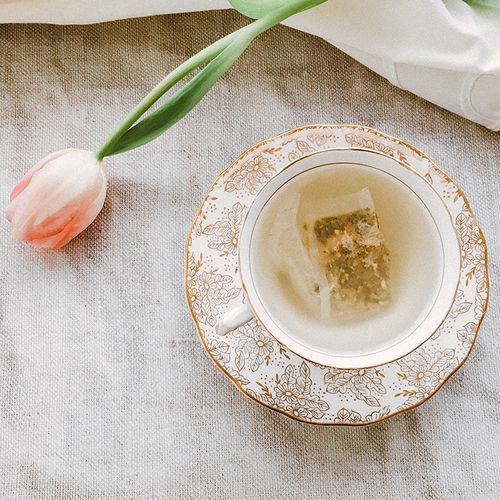Herbal teas, which are generally rich in vitamins, minerals and other healthful compounds, have been used as healing agents for thousands of years.
However, because of the prevalence of over-the-counter and prescription medications, most Americans don't think of drinking tea to treat common ailments. That's a mistake.
Dozens of scientific studies have supported the use of herbals for a wide variety of health problems. Herbal teas have the same active ingredients as herbs sold in capsules, powders and extracts Herbal teas also have fewer side effects than medication and can be much less expensive.
Loose tea herbs, which are available at health-food stores, tend to be more potent than tea bags. To prepare tea with loose herbs, use one heaping tablespoon of dried herb or three tablespoons of fresh herb in eight ounces of boiling water. Steep for 10 minutes.
For best results, drink four eight-ounce cups of herbal tea per day until the problem subsides. If you are age 65 or older, do not exceed three cups daily...or two cups daily if you are age 70 or older.
Best teas for treating common health conditions…
Colds And Flu
Echinacea, which has an aromatic, earthy flavor, promotes white blood cell production... acts as an anti-infection agent...and stimulates the immune system.
How to use: Echinacea should be used for no more than 10 consecutive days, because it loses its effectiveness when taken continually. Drink echinacea tea at the onset of cold or flu symptoms, such as sore throat, sneezing and/or nasal congestion.
*Check with your health-care practitioner before chinking herbal tea, especially if you are a pregnant woman, nursing mother or have a chronic medical condition. Some herbal teas should not be combined with certain drugs.
Caution: Echinacea stimulates the immune system, so people with autoimmune diseases. such as lupus, should consult a doctor before using this herb. People who are allergic to plants in the daisy family, such as ragweed, are more likely to have an allergic reaction to echinacea.
Other teas that fight colds and flu: Elder-flower and elderberry.
Digestive Disorders
Peppermint, which has a zesty, fresh taste, calms muscle spasms...eases intestinal cramping...contains antibacterial compounds...soothes ulcers...and freshens breath after a meal.
Caution: Do not drink peppermint tea if you are suffering from an acute episode of a digestive disorder, such as a gallstone attack. Seek immediate medical attention. Other teas that fight digestive disorders: Cardamom, ginger and cinnamon.
Headache
Lemon balm, which has a gentle lemon flavor and aroma, acts as an anti-inflammatory and antispasmodic...and contains magnesium, which acts as a muscle relaxant.
Caution: This herb may inhibit thyroid function. If you have low thyroid function (hypothyroidism), avoid lemon balm tea.
Other teas that fight headache: Feverfew and rosemary.
Insomnia
Linden flower, which has a sweet flavor and jasmine-like aroma, is rich in vitamin C...calms nerves...and promotes rest. In Europe, linden flower tea often is given to patients before surgery to help them relax.
Other teas that fight insomnia: Chamomile and passionflower.
Low Libido
Oat seed, which has a slightly sweet, milky flavor, relaxes the nerves...and is often used as an aphrodisiac.
Caution: Oat seed contains gluten, so this herb should be avoided by people with gluten intolerance.
Other teas that fight low libido: Cinnamon and raspberry leaf.
Top Tummy-Soothing Teas
Herbal teas are great for digestive symptoms, but which tea is best for which symptoms?
Abdominal cramps and ulcers: Chamomile tea. Its essential oils are anti-inflammatory and antispasmodic. Chamomile calms the nervous system, so it is good for digestive symptoms linked to stress.
Gas (flatulence): Fennel tea. Use when gas occurs after meals. Interestingly, fennel was once used in the US as a drug for the treatment of indigestion.
Bloating: Gingerroot tea. It also can help with gas, diarrhea, nausea, vomiting and morning sickness.
Irritable bowel syndrome (characterized by alternating constipation and diarrhea): Peppermint tea. It also can help with cramps, gas and bloating. Peppermint can aggravate heartburn (acid reflux) in some people, so go easy at first.
If you frequently have digestive upset: Try one-half to one cup of tea just before each meal or with meals. For occasional upset, drink a cup as needed to reduce the symptoms. Tea bags work as well as loose tea—use organic, if possible.
Try Super-Healthy White Tea
White tea is the most healthful tea according to a recent study. Derived from the same plant as green and black teas, white tea (called yinzhen) undergoes less processing than other varieties, so it retains more beneficial flavonoids, antioxidant plant compounds that help reduce the risk for heart disease and cancer. White tea has a sweet, delicate taste. It is available in specialty tea shops and some grocery stores.
Helpful: Drink three mug-sized cups of white tea daily.
